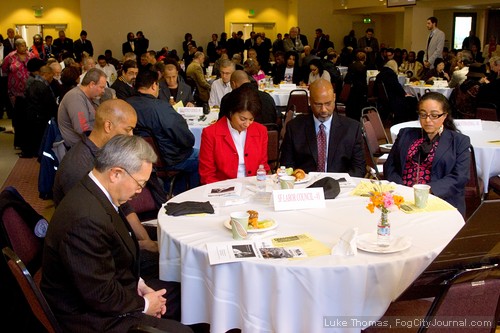
The San Francisco Labor Council hosted its annual breakfast Monday at the West Bay Conference Center in the Fillmore to honor clergyman and civil rights leader, Martin Luther King. Photos by Luke Thomas.
By Kat Anderson
January 17, 2012
The San Francisco Labor Council (SFLC) held its annual MLK breakfast yesterday at the West Bay Conference Center in the Fillmore. The event was attended by labor and community leaders, as well as a several electeds, all abuzz about economic justice, upcoming elections, healthcare reform, affordable housing and the collaboration of Labor with the Occupy movement.
A place was symbolically set for beloved labor leader, Walter Johnson, who passed away on January 12 following a heart attack. An enlarged photo of Johnson (taken by Linda Post) “sat” at the head table along with Mayor Ed Lee, newly-appointed D5 Supervisor Christina Olague, Assemblymember Fiona Ma, and SFLC Executive Director Tim Paulson. Various speakers recalled the Poor People’s Campaign, Dr. King’s last project, that highlighted our nation’s economic disparities while continuing to confront racism, militarism, and a self-centered society.
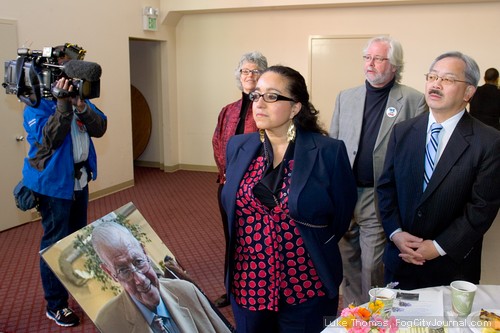
A photo of the late Walter Johnson was propped up on the head table with Mayor Ed Lee and District 5 Supervisor Christina Olague.
United Educators of San Francisco President Dennis Kelly said, “The Reverend Martin Luther King, Jr. confronted the problem of powerlessness and anonymity when he thought about where the Civil Rights movement would lead. What good is a vote if a person does not have dignity? What good is a right without respect? Martin Luther King, Jr. saw a way to provide respect to complement the rights that were being affirmed by the Civil Rights efforts in this country in the 60s. Dignity comes with work and a job. With a decent job, people rise from poverty and anonymity and put their stamp on society. And that led to the Poor People’s Campaign. Martin Luther King, Jr. spoke of the twin movements, the Labor movement and the Civil Rights movement, as the pillars of the just society that should follow the recognition of the equality of all men and women. The Labor movement built the concept and reality of the middle class whose members rose to form the 99 percent that are the core of the nation. The Civil Rights movement tore down the barriers that kept African-Americans from entering the middle class. Together, the two movements showed the way out of poverty and anonymous isolation.”
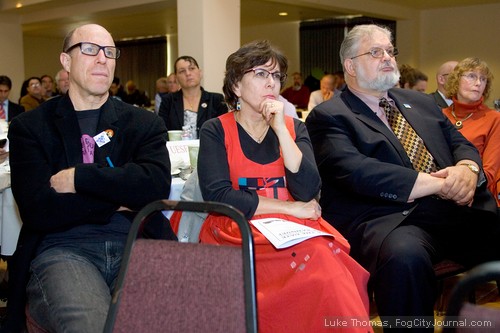
UESF President Dennis Kelly (right) with UESF Secretary Susan Solomon and UESF Political Director Ken Tray (left).
Also on people’s minds is the yet-to-be-defined role that Labor can take on with the Occupy movement. Several young students were asked to write essays comparing the Poor People’s Campaign with Occupy. The top place winners attended the Labor Council breakfast and shared their essays before being honored with certificates from elected officials.
First-placed contestant Zaheem Smith from Rancho Medanos Middle School, aged 11, read from his essay:
“The Poor People’s Campaign was a campaign that addressed issues of economic injustice and housing for the poor. The Poor People’s Campaign asked the federal government to help poor people with affordable housing and community outreach. At a glance, the Poor People’s Movement wanted equal provisions for all impoverished whether it be food, housing, education, or job assistance. These are the core values of the campaign. The Occupy Wall Street is similar to the Poor People’s Campaign because they both wanted the same goal for American citizens. They both were against the high unemployment and economic inequality. They both wanted everyone to be equal and for the 99 percent of Americans to stop struggling. As future leaders, we should keep Dr. King’s dream alive by following his legacy of nonviolence. We will stop fighting each other and become unified with each other. This country will become what Dr. King saw in his dreams. If the rich and poor can come together, we can all be happy and stop struggling just to survive.”
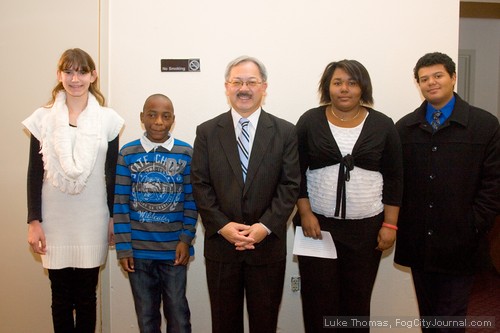
Essay finalists Doreen Pacini, Zaheem Smith, Braice Dozzie and Andrezonae Johnson with Mayor Ed Lee (center).
Olga Miranda, President of SEIU 87 (Janitors), accompanied by her 6 year old son, Joaquin Rubio, commented that the Poor People’s Campaign “has never been over. Everyone struggling to make ends meet is a member and just doesn’t know it.” Miranda praised young people, those “asking to help, those with a humble spirit,” as examples to aspire to because they “are going to grow up to be great leaders.” Miranda called on everyone to support her union as it embarks on contract negotiations next month. “Occupy Financial District,” she called it. “If you see us, don’t look the other way. We are not invisible. The trash is not taken out by fairies.”
Miranda also pointed out that members of her union are being assaulted by ICE, and being denied the ability to provide for and get benefits for their families. “We ask all our labor family to please stand with us,” she said.
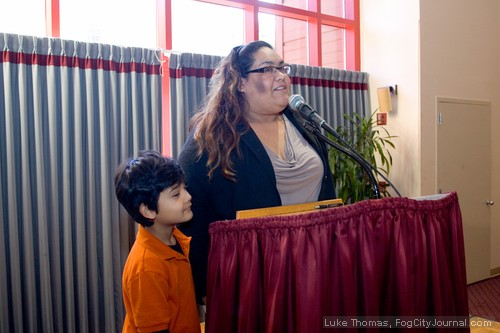
SEIU 87 President Olga Miranda and son.
Dr. Steven Pitts, Labor Policy Specialist at UC Berkeley, reflected on Dr. King, the Poor People’s Campaign and “lessons for today.” Dr. King talked about the “duality of interests” – you cannot fight for social justice and not fight for economic equality,” Pitts said. When MLK became an honorary member of the ILWU Local 10, his brand of activism became “civil rights unionism.”
Still today, the role of labor in the community must be to fight for racial equality and economic justice, Pitts said. Pitts believes there are social movements and then there are social bases within a movement from which leaders emerge. He says that social movements have “staying power.”
Dr. Pitts does not see “Occupy” as a movement – yet. He questions “what is its social base”?
There are various communities with disparate interests within “Occupy.” How do we activate those various communities? Pitts’ answer is that leaders must step forward, connections must be made, interests must coalesce. He believes that movements always have leaders, even if those leaders are authoritarian or democratic.
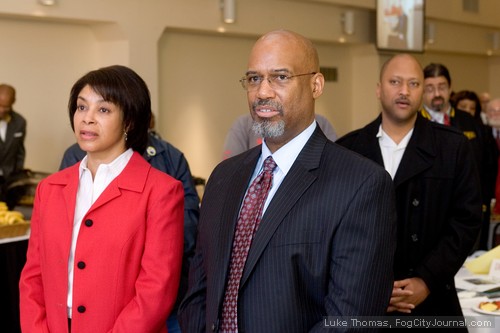
UC Berkeley Labor Policy Specialist Dr. Steven Pitts.
More photos
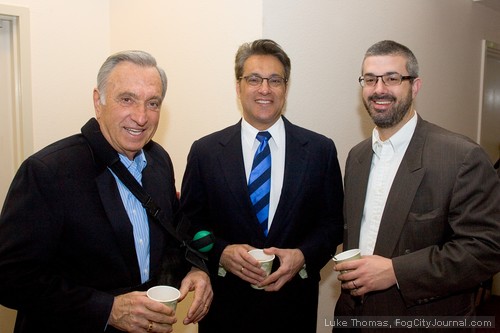
Former Mayor Art Agnos, Sheriff Ross Mirkarimi and SEIU Political Director Chris Daly.
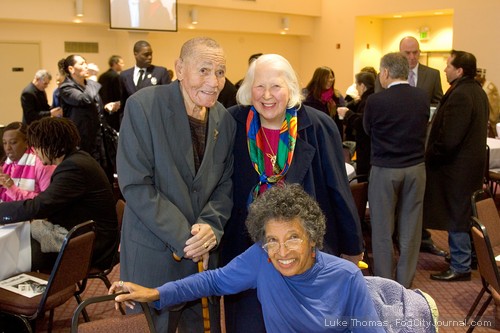
Jane Morrison, Leroy King and Ina Dearman.
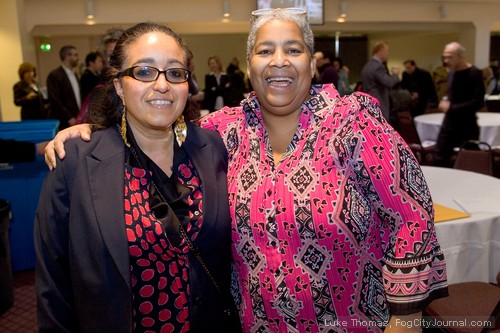
District 5 Supervisor Christina Olague and Shelly Bradford-Bell.
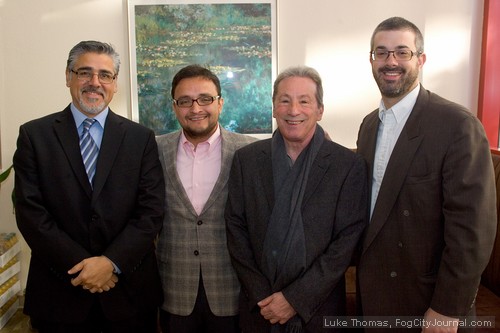
Supervisors John Avalos and David Campos, Assemblymember Tom Ammiano and SEIU Political Director Chris Daly.
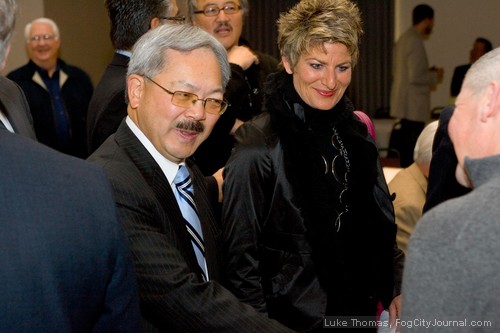
Mayor Ed Lee is greeted by SEIU organizer Gabriel Haaland.
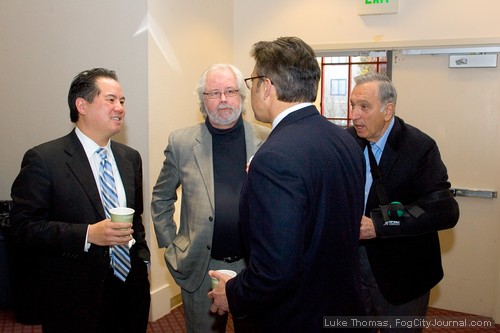
Sheriff Ross Mirkarimi and Mayor Art Agnos are greeted by Assessor Phil Ting and SFLC Executive Director Tim Paulson.
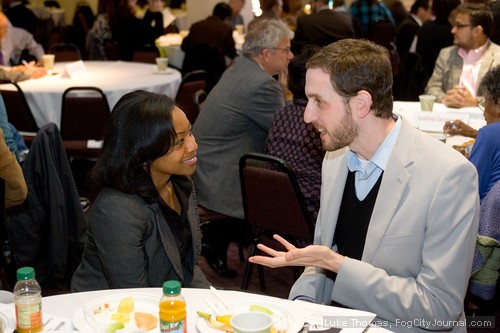
Supervisors Malia Cohen and Scott Wiener.
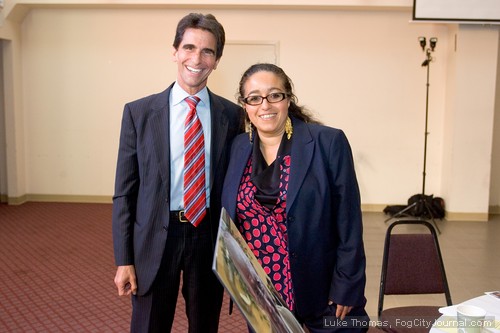
California Senator Mark Leno and D5 Supervisor Christina Olague.
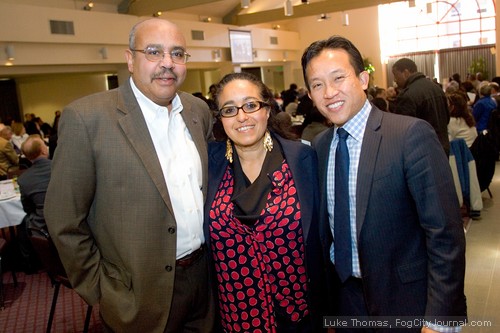
D5 Supervisor Christina Olague with Fred Griffin and Board of Supervisors President David Chiu (right).
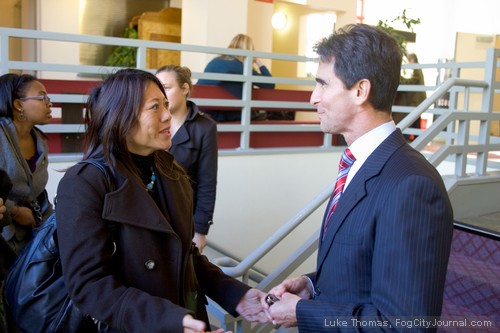
Assemblymember Fiona Ma and Senator Mark Leno.
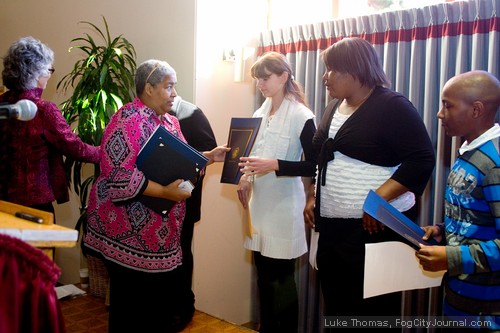
Essay finalists are presented with commendations by Shelly Bradford-Bell.
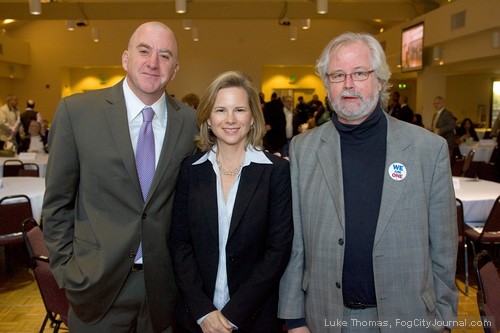
Kat Anderson with San Francisco Firefighters Local 798 President Tom O'Connor and SFLC Executive Director Tim Paulson.
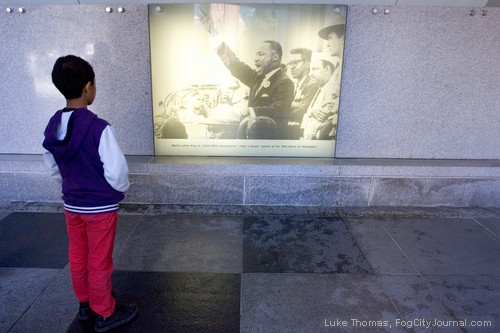
Dreaming of MLK's dream, a young boy admires an image of Martin Luther King at Yerba Buena Gardens.


 The Hunger Site
The Hunger Site
January 17, 2012 at 1:12 pm
“Dr. King talked about the “duality of interests” – you cannot fight for social justice and not fight for economic equality,” Pitts said.
What about the King who said, in his Riverside Church speech “Beyond Vietnam,” that “The greatest purveyor of violence in the world today is my own government”? (Forty five years ago, on April 4, 1967, a year to the day before his assassination, on April 4, 1968.)
The King who said, in the same speech, that, ”A nation that continues year after year to spend more money on military defense than on programs of social uplift is approaching spiritual death”?
The King who saw all the goals of his poor peoples’ campaign fade with the escalating cost of the Southeast Asian War that began in Vietnam?
Are the Democrats who make up 100% of this celebration really so fearful of acknowledging that Obama’s wars and military budget, escalating beyond even those of George Bush, are drone bombing the hope once expressed in King’s poor peoples’ campaign, and, more recently, in the Obama campaign itself?
I don’t think Obama’s blameless, i.e., helplessly hemmed in by institutions. He’s not all-powerful, but he is the Commander-in-Chief, with absolute executive authority over the U.S. military, codified in the U.S. Constitution.
But, I also think these local Democrats and labor brass, all smiles as they turn King’s Day into a hollow ritual, are every bit as much to blame.